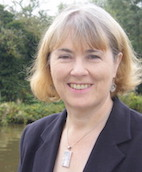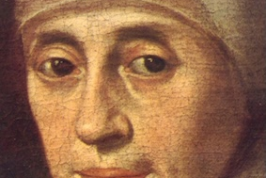Westminster Diocese: Building social peace

Dr Pat Jones
Dr Pat Jones, who studied at the Centre for Catholic Studies at Durham University, gave the following presentation at the online Westminster Social Justice and Peace Forum on 5 December with the theme, 'Learning from the Pandemic'.
One of the blessings of this year for me has been a weekly family zoom call with my six brothers and sisters living in four different countries. The image I want to offer you for the pandemic comes from a recent family zoom. My brother is a teacher in a secondary school in Bootle, one of the most deprived parts of Merseyside where almost a third of the children live in poverty. He was elated at half term because they had managed to keep the year 11 children in school for every week despite rocketing infection rates. He described the challenge of teaching Spanish to a classroom of kids wearing hoodies and coats, because the windows and doors are all open for ventilation and it is cold. He has to wear his coat too, and stay in his teacher square at the front, to preserve social distancing. And he has to teach simultaneously on zoom to the isolating kids and to the class in front of him. And the last straw he, said, was when the toast trolley kept trundling up and down the corridor and no-one could hear a thing. I asked him about the toast trolley; he said simply; "they're hungry; we have to feed them".
This is an image of the pandemic I want to unpack. Three things strike me strongly, and each resonates with themes from Pope Francis' recent letter, Fratelli Tutti.
The first is that we can see how, in Francis' words, 'ordinary people' are 'valiantly shaping the decisive events of our shared life'. He also calls them the 'saints next door'. You will all have your own examples; and many of you will be counted in this. This, he suggests, is what gives us hope. My brother and his colleagues are passionate about their students' life chances. Those kids in Bootle need that GCSE far more than many others; and they play their part. My brother said that the troublesome kids have behaved perfectly this term; they want to learn; the pandemic has made them realise that education matters. Francis talks about how God 'continues to sow abundant seeds of goodness in our human family'. I wonder who for you would be the valiant local heroes, the ordinary people, whether faith motivated or not, who are shaping a better society from below?
I am also disturbed by the toast trolley. This diocesan community is deeply committed to tackling children's hunger, so this is not news. But it still contains a profound challenge. Why are children in Bootle - or anywhere - going to school hungry? What has happened to family life? What has happened to employment and to the social safety net that the benefits system is supposed to ensure? These are not new questions; but the pandemic has revealed starkly the ways that our social and economic systems are broken, and who is suffering. It's not enough to send a toast trolley round, vital as that is. Someone has to work out what's going wrong and change it.
For Pope Francis, what the pandemic has revealed goes way beyond the need for more money or more services. In Assisi recently, talking about the economy, he said that anyone who thinks that we just need to improve what we're already doing or refine existing regulations is denying reality. He proposes that the shock of the pandemic calls for a radical re-set. He calls it a 'place of conversion'. It is inviting us to radical change.
Just ponder that; a place of conversion. Has it changed you? And if so, how? I read an article recently by John Harris reflecting on how we long for normality to return, and pointing out the danger, that we will forget what we have seen and heard, in the relief of being able to resume some of the things we have given up. We will be tempted to think that the vaccines have solved the problem. But he also says, maybe not; because the country has changed; we have changed. He points to Black Lives Matter for example as a new reality that won't go away. We need to make sure in the months ahead that we don't lose the vital truths we have seen in the pandemic. We must not settle for the old normality. In particular, we need a fundamental re-think about welfare and the economy.
But what must we do and how do we find a way forward? The danger is that we're so immersed in the immediate - making the toast and pushing the trolley - that we can't find the energy or space to look at the bigger systems. And we need some kind of compass; the question of what kind of social safety net we need is not solved just by asking for more Government spending.
There are two themes from Fratelli Tutti that I think can help us. I know that many of us are already deeply committed to various kinds of solidarity, locally and globally. In some ways we could just say - carry on. But Francis has reflected deeply on what the pandemic has revealed about our world. He has drawn out and deepened the themes from CST that we need to pay attention to now. So we should listen.
The first theme is his idea of social peace. We should get used to this phrase. We have talked about social justice for years; and happily we have always kept peace tethered to it. But we tend to associate the theme of peace with issues related to war and conflict and nuclear arms. These are vital of course. But so too is a broader kind of peace, which is not a static state but a process, a way of living together.
Social peace is the outcome if we live in what Francis calls fraternity or social friendship; it's about being open to others, encountering those who are different, listening and discovering the good planted in everyone by God; and making a gift of ourselves to others in our social relationships. It expresses our fundamental belief in the dignity of each person, the truth at the centre of our social vision. It is built from below; it can ONLY be built from below.
Francis gives us some pointers; it needs everyone to feel they belong; no-one to be excluded; it needs 'renewed encounter with the most impoverished and vulnerable sectors of society'; and it is something we all craft every day. And social peace is necessary because our society is riven with the opposite; aggression and social violence confront us daily; in racism; in damage to our environment; in structural inequalities between north and south. Where do you think we need to build social peace?
So we need to pay attention to the kind of social bonds we have and how these have been affected by the pandemic; which social relations have been more fractured in these months? Where is social peace lacking, and what can we do about it? The Black Lives Matter movement is one example. For me personally, another kind of social violence we can now see more clearly has been the increase in domestic violence. Women are trapped at home with violent partners; their mental health gets worse; refuges are full; 42% fewer refuge vacancies in the first lockdown; support services are reduced in order to be Covid-safe. This is such a hard issue to tackle; and even harder are the related issues of trafficked women and women who are trapped in prostitution, one of the worst forms of violence against women. I was glad that Francis included violence against women in his explanation of social peace. This does not often get on our Catholic agenda, but it should. We cannot live in social peace until these kinds of violence have been abolished.
And finally, Francis gives a chapter to the need for what he calls 'a better kind of politics'. This takes me back to the toast trolley and to the recent letters from faith leaders and Caritas leaders asking the Government to make the £20 uplift to Universal Credit permanent. Francis wants a politics based on social peace, social friendship, with charity at its heart; that truly serves the common good, and so gives priority to the poorest. He gives us a sophisticated analysis of what's going wrong in populist politics and neo-liberalism. He highlights what he sees as the biggest issue, employment, which enables people to flourish and contribute.
How relevant is this as the news every day is full of jobs lost! But here's my dilemma. Like his predecessors, he is wary of welfare programmes and thinks they should be just a temporary solution. There's a fascinating history here but we have no time to go into it. Yet when we look around the UK, how could we survive without welfare? Our temptation throughout this crisis has been to call for more money, more government response, to so many needs. But we can see that this can't go on. So what is the answer? Can we do a better kind of politics to find our way to a society in which no-one is hungry? One that means we don't need toast trolleys.
Read more about Westminster Justice and Peace - https://westminsterjp.wordpress.com/


















